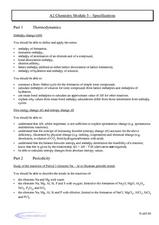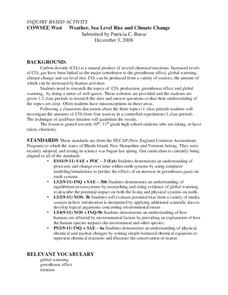Curated OER
Periodic Trends
Students review how physical and chemical change while discussing the properties. They diagram the electron dot for the first four elements in the periodic table. Students identify elements and state what they know while investigating...
Curated OER
Making Plastic
Students experiment to create a plastic solution. In this science instructional activity, students use sodium borax and polyvinyl alcohol to create their solution, then identify, discuss, and chart observations on the end product.
Curated OER
Forest Floor Terrarium
Students study the aspects of a forest floor ecosystem, including decomposition, the water cycle, food webs, the needs of living things, and physical vs. chemical change over an extended period. In addition, students conduct observations...
Curated OER
Introduction to Materials Science - Part B
Students are able to give specific examples of what to do and what not to do during given safety situations, and classify materials as metals, polymers, ceramics/glass, or composites. They are able to distinguish between chemical and...
Curated OER
What's The Scoop?
Students explore the properties of matter. In this cross curriculum three states of matter science instructional activity, students listen to the poem "Eighteen Flavors" by Shel Silverstein, and predict what will happen if listed...
Curated OER
Reaction Reasoning
Third graders experiment with chemical reactions and examine what happens to the atoms when different reactions occur. In this matter lesson students divide into groups and complete a lab experiment.
Curated OER
Candle Observations
Students view a demonstration and record and questions and observations that they have. In this candle lesson students discuss their observations and give examples of the changes they saw.
Curated OER
Properties of Matter
Third graders explore forms of matter through reading, hands-on science activities, and research using the Internet. Students create a booklet, directions given, that they title and decorate, to later serve as a review visualization...
Curated OER
Chemical and Physical Changes
Eighth graders investigate different gas behaviors. In this chemistry lesson, 8th graders describe how changing volume and temperature affect gas particles motion. They collect data and make a generalization about these variables'...
Beyond Benign
Packed Up Properties
Determine physical properties of potential packaging materials. Continuing from previous lessons in the series, the resource asks groups to identify physical properties of the substances. They test for conductivity, solubility, water...
National Nanotechnology Infrastructure Network
Synthesis and Characterization of CdSe Quantum Dots
Does the size of a sample change the physical properties of that substance? It turns out it can! Young scientists combine physics and chemistry to synthesize CdSe quantum dots and record their color properties. Learners should...
NASA
Christa's Lost Lesson: Effervescence
How are chemical reactions affected by gravity? Learners explore the phenomenon of effervescence as part of the Christa's Lost Lessons series. They compare findings in an experiment on effervescence to a video of a similar experiment in...
Cornell University
Alka-Seltzer Rockets
Blast off! An engaging hands-on activity has pupils create rockets powered by Alka-Seltzer. They learn about the physics behind these rockets throughout the process.
Cornell University
Atomic Bonding
Explore the connection of surface area to bonding within atoms. Learners complete lab investigations to model changing surface area with different sizes and concentrations of atoms. A flour fireball demonstration follows the labs to...
Curated OER
Chemistry Module 5 - Specifications
While this resource does not provide problems for chemistry learners to solve, it outlines skills that they should have and concepts that they should grasp. Topics include thermodynamics, periodicity, redox equilibria, transition metals,...
University of Georgia
Antacid and Uncle Heartburn
Household materials can be used for more than cleaning! In this collaborative experiment, emerging chemists use products such as vinegar and liquid antacid to explore chemical reactions that commonly occur in the human body.
Curated OER
Getting to the Core of Climate Change
Students investigate climate changes by graphing and analyzing ice core data from Greenland and Antarctica. They create, explain and report the pattern of data on a graph of ice core data. In addition they find relationships between the...
Curated OER
Integrating Physics-Atomic Fingerprints
In this atomic fingerprint worksheet, students read about the Bohr model and electrons changing energy levels and emitting energy. They answer questions about the atomic spectrum and the fingerprints for specific atoms.
Curated OER
Salt, To Use or Not To Use
Fifth graders develop a deeper understanding of chemical and physical changes. They explain how salt is made, used, and the affects it has on the body. They explain that salt in moderation is important to our health.
Curated OER
Ice Cream Science
Young scholars review properties of matter and discuss how materials change when things are done to them. They observe how materials change as a reaction to temperature by following the procedure to make ice cream and recording the...
Curated OER
Chemistry: Balancing Chemical Equations
Eighth graders practice balancing chemical equations. For this chemistry lesson, 8th graders explain why it is necessary to balance equations. They complete practice worksheets individually.
Curated OER
Matter
In this matter worksheet, students complete a graphic organizer by describing the properties of matter, the changes of matter, and how matter can form mixtures.
Curated OER
Quite a Reaction
In this chemical reaction worksheet, students experiment with soda and Mentos candy to observe a chemical reaction. Students describe the reaction, identify the investigation as descriptive or qualitative and make a prediction if the...
Curated OER
Weather, Sea Level Rise and Climate Change
Students compare the carbon dioxide content of four different samples. In this chemistry lesson plan, students research the causes of global warming. They explain how humans contribute to rising global temperature.























